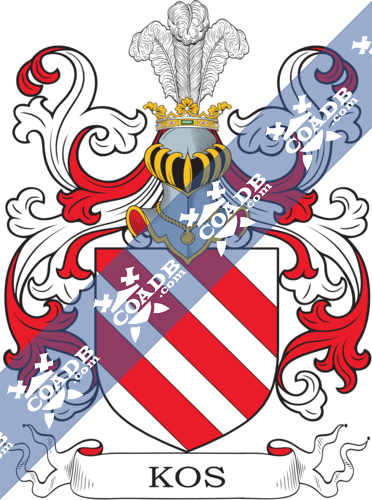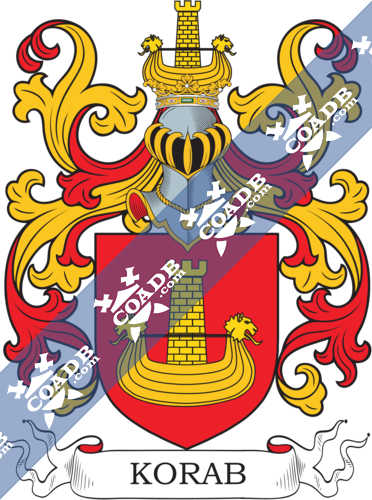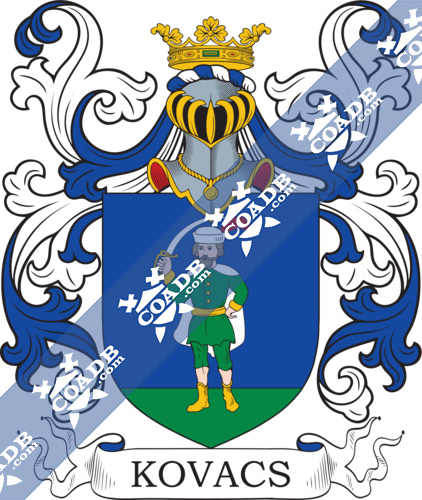Kos Family Crest, Coat of Arms and Name History

Kos Coat of Arms Gallery
Don’t know which Coat of Arms is yours?
We can do a genealogical research. Find out the exact history of your family!
Learn MoreKos Origin:
Germany
Origins of Kos:
According to the early recordings of the spelling of the name, this interesting and unique name was listed in many forms containing as Kos, Kose, and Kosel, this very interesting surname is Mid-European. It mainly noted in Germanic areas such as Germany itself, Austria and the now the Czech Republic. It has two possible origins. The first is an old word of the pre 10th century, ‘kos,’ which means blackbird. In old times, the blackbird had a quite undeserved fame for being intelligent or even naughty, and it demanded that this word was then used in a transmitted sense for a person who was a businessperson or trader. It has to be said that trying to ascribe precise meanings to surnames created sometimes eight hundred years or more ago, is at best a risky task. The original meaning is open to opinion, but logic shows that had it indicated dishonesty, it could hardly have remained all these years. There is a possible secondary meaning in that the origin could be, at least for some name ancestors, from the Yiddish word ‘kos’ meaning a cup or glass, and hence a name for a producer or seller of these wares. The surname is one of the first to be recorded in the early German records, which are much the initial on the continent. These include Hermann Kosele of the city of Worms in 1321, and Heinrich Kos of Aufkirch, Uberlingen, Germany, in 1366.
Variations:
More common variations are: Koos, Koss, Kose, Kosi, Koso, Kosu, Kjos, Kaos, Kosy, Kios.
Germany:
The surname Kos first appeared in Mecklenburg, where the Ross family donated greatly to the advancement of an emerging nation, and would later play a large role in the tribal and national conflicts of the area. Over time, the Ross family name department into other houses, where their influence continued to felt because of the important role they played in the local social and political matters.
Ireland:
Many of the people with surname Kos had moved to Ireland during the 17th century.
United States of America:
Individuals with the surname Kos landed in the United States in the 17th century. Some of the people with the name Kos who arrived in the United States in the 17th century included Marretie Kos at the age of 2, arrived in New York in the year 1657.
Here is the population distribution of the last name Kos: Poland 8,545; Croatia 5,148; Slovenia 4,406; Hungary 2,487; Germany 2,253; Turkey 2,236; United States 2,149; Czech Republic 2,090; Netherlands 1,674; Bosnia and Herzegovina 1,219.
Notable People:
Tomasz Kos (born April in the year 1974 in Koło) is an old Polish football player who spent his time playing mostly with German clubs 1. FC Nuremberg and FC Erzgebirge Aue.
Rudolph Edward Kos (born April 1945) is an old Roman Catholic priest who appeared guilty of sex crimes in the Diocese of Dallas. In 1998, Kos was condemned of three counts of complicated sexual assault and sentenced to life in prison. In April 1992, a therapist had told officials of the parish that Kos was a “classic textbook pedophile.” However, Priest Charles Victor Grahmann acknowledged he did not read this record and allowed Kos to have entrance to children for almost one full year more. The last documented occurrence of abuse was 11 months later.
René Kos (born October 1955) is a retired cyclist from the Netherlands. He had his best performances in motor-paced racing, winning the world championships in 1981 and finishing in second place in 1983. He also finished second in 1980 but was disbarred for failing the doping test. He won the national motor-paced cycling championships in the years 1981, 1982, 1984 and 1985.
Józef Kos (September 1900 in Bącz – April 2007 in Sierakowice) was one of the last remaining experts of the First World War and one of the oldest people in Poland at the time of his death. He was an ethnic Kashubian. In 1918, he served for the German Empire in the German Army during the last year of the war.
Blazons & Genealogy Notes
First notation: 1230 W polu srebrnem, a trzy skosy czerwone. Klejnot: trzy pi”ra strusie srebrne







